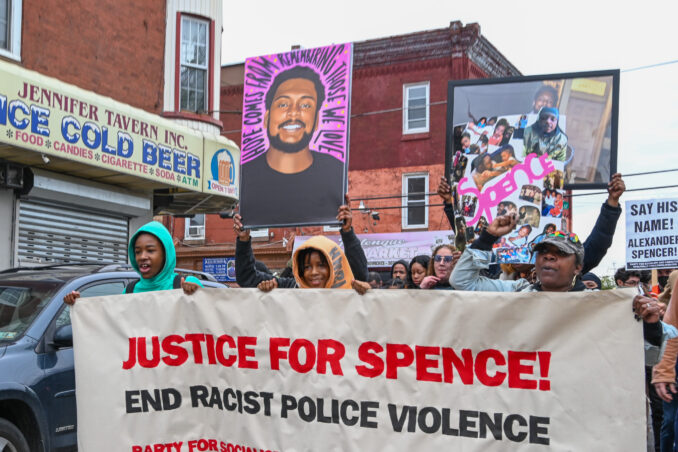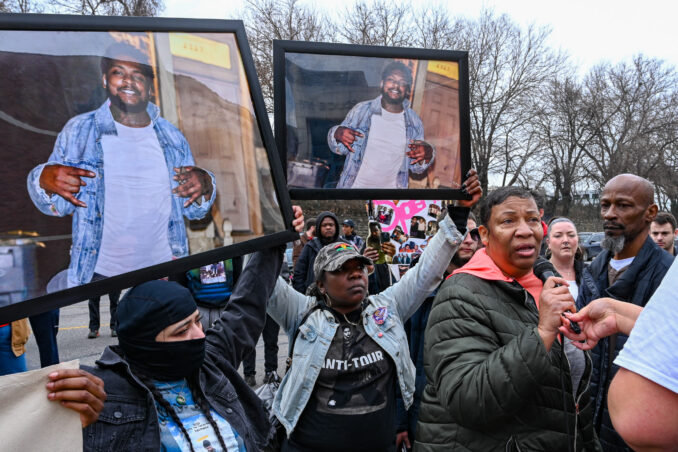Justice for Spence – End stop-and-frisk
Philadelphia
The family and friends of Alexander “Spence” Spencer, along with dozens of concerned community members, demonstrated on Feb. 10 outside the Jennifer Tavern beer deli in North Philadelphia, where police shot and killed Spencer Jan. 26. Affectionately called Spence by his family, the 28-year-old Black man was murdered during a stop-and-frisk operation inside the tavern.

Protestors march past the Jennifer Tavern, where Alexander Spencer was killed by cops. Jan. 26, 2024. (Credit: Joe Piette)
Police initially claimed Spencer was killed during a scuffle with police after he allegedly wounded one of the officers. According to police, the injured officer’s partner returned fire, killing Spencer.
The demonstration was fueled by the Jan. 30 release of a surveillance video which contradicted the police report.
Spencer’s mother Yvette Spencer told Workers World: “Police came to my house on Jan. 26 and told me, ‘Your son shot a cop,’ but then I saw the video and knew it was a lie.”
Speaking during the rally, Spencer’s sister Eve added: “He surrendered, but they took his life. It was two against one, he was tasered, and they shot him in the back.”
After the Spencer family questioned the initial police accounts, and statements from several witnesses to the shooting contradicted the original police report, the surveillance video, taken by the deli owner, was released to the media. From the video it appears that police entered the store asking if anyone had a gun and immediately began to frisk Spencer.
The two officers pushed him against a wall, and even though Spencer had his hands up, they wrestled him to the ground. Both officers piled on top of him, and one officer shot him in the back multiple times.

Spence’s mother Yvette (holding mic), standing between his sister and father Kenneth, directs her anger over her son’s murder at cops and police officials lined up between protesters and the 24th/25th Police Precinct. Philadelphia, Feb. 10, 2024. (Credit: Joe Piette)
Whether Spencer’s gun was actually fired during the scuffle, wounding the cop, remains in question. From the video there is no evidence that Spencer fired a gun, but it clearly shows that one of the cops repeatedly discharged his gun into Spencer’s back.
Both officers involved claim they had their body cameras turned off. The officer who fired the shot has been identified as Raheem Hall of the 24th Police District.
Several speakers addressed the history of police violence in Philadelphia. Just over five months ago, on Aug. 31, 2023, the community was protesting the murder of Eddie Irizarry, Jr, a 27-year-old Puerto Rican man, shot to death by police officer Mark Dial on Aug. 14. Irizarry was sitting in his parked car with the windows up when Dial got out of his police car and, five seconds later, fired six shots, killing Irizarry — whose only “weapon” was a 3-inch pocketknife.
Both Dial and the two officers involved in killing Spencer are part of a police precinct that includes the 24th and 25th Police Districts. Like the earlier marches for Irizarry, the protest calling for justice for Spencer ended up at that precinct. Spencer family members and others confronted the officers gathered outside, as speakers reminded the crowd that it was “the power of the people” that put Dial in jail.
Dial is currently awaiting trial on seven charges, including murder. Efforts by the Philadelphia Fraternal Order of Police (FOP) to get a judge to drop the charges were met with community resistance.
Stop-and-frisk equals license to kill
Rukia Lumumba, with Straight Ahead and Abolitionist Law Center, spoke outside the precinct: “We will no longer sit back and watch while our loved ones are shot in the back while lying on the ground. Cherrell Parker [Philadelphia’s new mayor] is inciting dangerous rhetoric that encourages police violence.”
Upon taking office in January, Parker, who ran with full backing from the FOP, hired more police and reinstated stop-and-frisk in Philadelphia, despite acknowledging the research that determined that stop-and-frisk disproportionately targets Black and Brown people, especially Black men.
Geo Maher, author and coordinator of the Abolitionist School, raised that “stop-and-frisk gives power to the police to stop and harass people — it gives police license to kill. The police protect white power and serve the rich. We can’t reform the essential functions of the police.
Maher concluded: “Change comes, not from elections, but when people take to the streets like in 2020 [in response to the police murder of George Floyd] and take on the system. The rich are only defeated when they have to run for their lives.”

